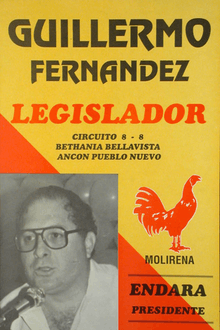Nationalist Republican Liberal Movement
| Nationalist Republican Liberal Movement | |
|---|---|
| Leader | Sergio González Ruíz |
| Founded | October 1, 1982 |
| Merger of |
CPN, TPN, MLN |
| Headquarters | Panama City, Panama |
| Ideology |
Liberalism,[1] Conservatism[2][3] |
| Political position | Centre-right |
| Colours | Yellow, Red |
| Seats in the National Assembly |
2 / 71 |
| Party flag | |
 | |
|
Politics of Panama Political parties Elections | |

The Nationalist Republican Liberal Movement (Movimiento Liberal Republicano Nacionalista, MOLIRENA) is a center-to-right, pro-business liberal political party in Panama.[4]
It was founded on 21 October 1981 by now defunct Third Nationalist Party, National Patriotic Coalition, National Liberation Movement and factions that had earlier split off from the National Liberal Party and Republican Party. [5] This party evolved as an alliance of traditional, oligarchy-controlled, primarily conservative organizations, which opposed the government of the military. [6] According to a Soviet Union news article, "The MOLIRENA was aptly called a "patchwork quilt" by local journalists. The characteristic feature of the party was the link of the agrarian oligarchy with the commercial bourgeoisie, i.e. a union of the most conservative segments of the country. The names of members of MOLIRENA leaders César Arrocha Graell, Guillermo Arias and Rene Crespo, who, as members of the government before 1968, took part in the appropriation of almost a billion dollars from the state treasury, were mentioned in the local press in connection with former "merits."" [7]
In 1984, the MOLIRENA was part of the Democratic Opposition Alliance (ADO) which lost the presidential and legislative elections following suspected widespread fraud by the military. [8] During 1987, the MOLIRENA became increasingly involved in confrontations with the government, openly campaigning through strikes and street demonstrations, which were violently suppressed, for the resignation and removal of General Manuel Noriega who was accused of drug trafficking, electoral fraud, corruption and murder. [9]
The MOLIRENA was again part of the Democratic Alliance of Civic Opposition (ADOC) electoral alliance in May 1989 which supported the presidential candidacy of Guillermo Endara of the Arnulfista Party [10] and, after the official ratification of the results following the US military invasion in December. Guillermo Ford became Second Vice-President of the Republic (1989–1994).During this term Alonso Fernandez Guardia was president of the National Assembly (1991). [11]
For the Panamanian general election, 1994 the MOLIRENA was the main component of the Alliance for Change '94, with the MOLIRENA's Rubén Dario Carles as the coalition's presidential candidate. He polled 171,192 votes (16.05%) and came fourth[12]
In 1999 MOLIRENA allied with the Union for Panama (ADP) and its candidate Mireya Moscoso. [13]
In 2004 MOLIRENA allied with the Vision of the Country (ADP) and its candidate José Miguel Alemán. The party won 8.6% of the popular vote and 4 out of 78 seats. [14]
In 2009 MOLIRENA allied with the Alliance for Change (ADP) and its candidate Ricardo Martinelli. [15]
In 2014 MOLIRENA allied with the Democratic Change once again, and its candidate Jose Domingo Arias but ultimately lost the election.
After the election result which was not good for MOLIRENA, it's president Sergio Gonzalez Ruiz resigned his post and the presidency fell on San Miguelito Legislator Francisco Aleman.
References
- ↑ Perez, Orlando J. (2000), "The Past as Prologue?: Political Parties in Post-Invasion Panama", Post-Invasion Panama (Lexington Books), p. 129
- ↑ Political Handbook of the World 2008, CQ Press, 2008
- ↑ McTernan, Benedict (2004), Political Risk Yearbook, 2004 1, Political Risk Services, p. 35
- ↑ Library of Congress, Federal Research Division. Panama: A Country Study. Ed. Sandra W. Meditz and Dennis M. Hanratty. Washington: GPO, 1989. Pp. 314.
- ↑ Historia del MOLIRENA
- ↑ Political Parties of the Americas, 1980s to 1990s: Canada, Latin America, and the West Indies. Ed. by Charles D. Ameringer. Greenwood Press. 1992. Pp. 481.
- ↑ JPRS Reports. Foreign Broadcast Information Service. 1988.
- ↑ Elections in the Americas : a data handbook / ed. by Dieter Nohlen, Vol. 1. [Oxford] [u.a.]: Oxford Univ. Press, 2005. Pp. 533.
- ↑ MOLIRENA
- ↑ Elections in the Americas : a data handbook / ed. by Dieter Nohlen, Vol. 1. [Oxford] [u.a.]: Oxford Univ. Press, 2005. Pp. 533.
- ↑ Political Handbook of the world, 1993. New York, 1993. Pp. 637.
- ↑ Elections in the Americas : a data handbook / ed. by Dieter Nohlen, Vol. 1. [Oxford] [u.a.]: Oxford Univ. Press, 2005. Pp. 534.
- ↑ Elections in the Americas : a data handbook / ed. by Dieter Nohlen, Vol. 1. [Oxford] [u.a.]: Oxford Univ. Press, 2005. Pp. 534.
- ↑ Elections in the Americas : a data handbook / ed. by Dieter Nohlen, Vol. 1. [Oxford] [u.a.]: Oxford Univ. Press, 2005. Pp. 535.
- ↑ Electoral Tribunal
See also
- Liberalism
- Contributions to liberal theory
- Liberalism worldwide
- List of liberal parties
- Liberal democracy
- Liberalism in Panama
| ||||||||||||||||||||